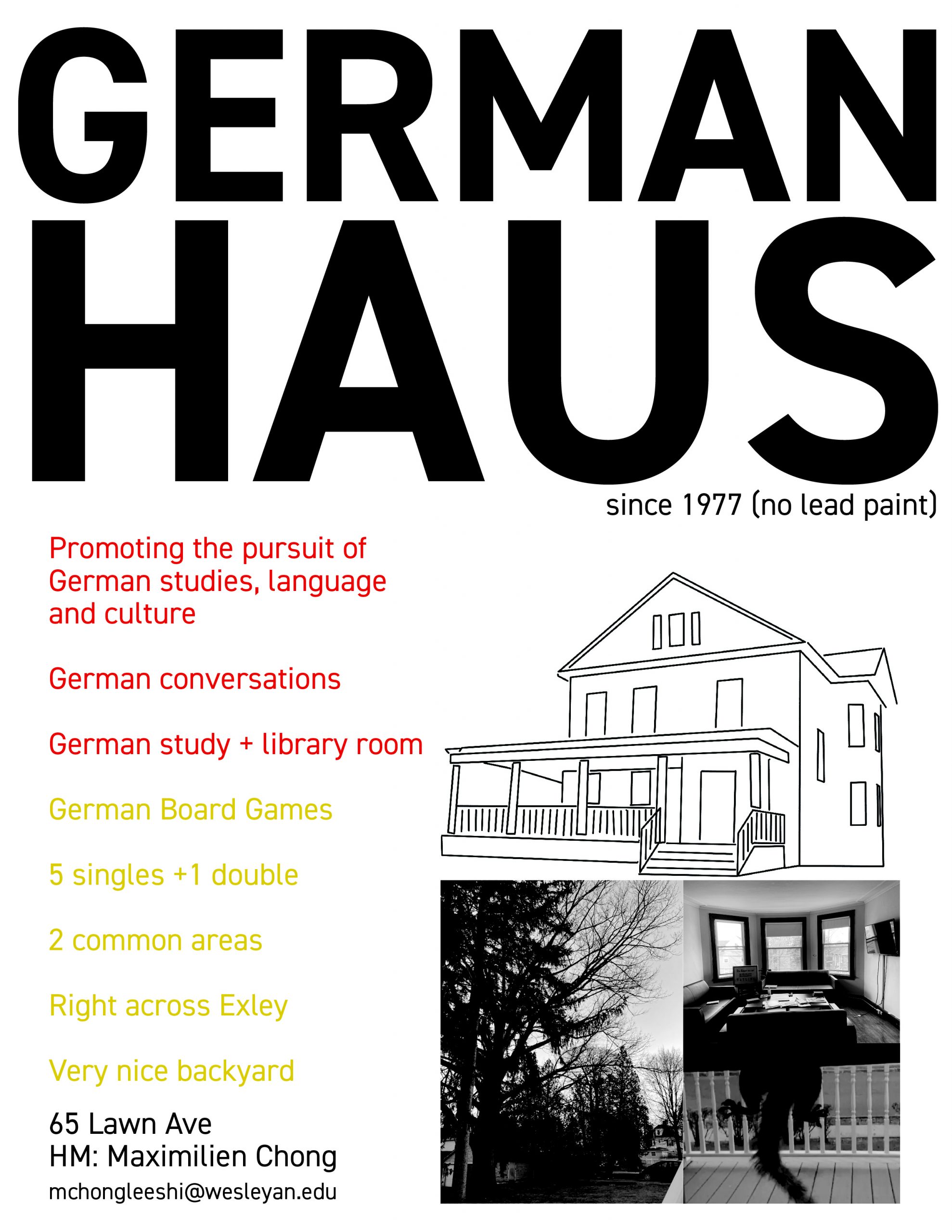
Month: March 2021
Miranda Haymon ’16 talks about her career and what it meant to study abroad in Berlin

Miranda Haymon ’16, GRST and THEA double major discussed her career after graduation and her artistic process with Sam Morreale ’19 on March 17th. Her study abroad semester in Berlin during her sophomore played an important role in her life. She emphasized how important and helpful it was for her theatre career to be a GRST major and getting a liberal arts education. You can watch their conversation on YouTube.
Haymon’s upcoming radio play version of Pedro Pietri’s “The Masses Are Asses” (1974) will be aired on WESU Middletown 88.1FM this spring.

This picture was taken from Miranda’s bb_Brecht performance. Here is a video clip from it–> https://www.instagram.com/tv/CKMIonfjoq_/
You can follow Miranda on Instagram.
Miranda Haymon (she/they) is a Princess Grace Award/Honoraria-winning director, writer and curator. Recent projects include A Cakewalk (Garage Magazine & Gucci), Really, Really Gorgeous (The Tank), Everybody (Sarah Lawrence College), In the Penal Colony (Next Door @ New York Theatre Workshop, The Tank) and Mondo Tragic (National Black Theater). Haymon is a Resident Director at Roundabout Theatre Company and The Tank, a New Georges Affiliate Artist, a Usual Suspect at New York Theatre Workshop, a Space on Ryder Farm Creative Resident, member of the Lincoln Center Theater Directors Lab, and the Wingspace Mentorship Program. Haymon has held directing fellowships at WP Theater, New York Theatre Workshop, Manhattan Theatre Club, Roundabout Theatre Company, and Arena Stage. Haymon graduated from Wesleyan in 2016. For more information, please visit www.mirandahaymon.com.
Sam Morreale (they/them) is an advocate and facilitator for QTBIPOC+ storytellers and makers. Most of their work takes form through producing, directing, and consulting, particularly with a practice rooted in anti-racism and anti-oppression, transformative justice, healing and harm reduction. They have a unique view of the theatrical landscape, having worked in various capacities throughout the American Theater Industry quite early in their career. Recent Work: Facilitator/Curator for Rattlestick Playwright’s Theater, Community Conversations. Consultant: ART/NY, Center Theatre Group, Boston Court Pasadena.
Bridging the Gap with Germany during the Pandemic

By Iris Bork-Goldfield, Adj. Professor of German Studies
In March 2020, students were told to return from their study abroad programs, and we faculty were asked not to leave the U.S. Four of our students had just arrived at our Smith program in Hamburg, Germany, when they received that unwelcome message to pack again and return home. In the summer, I learned that our exchange student from Freiburg would not be coming to Wesleyan because of COVID. This meant that I would be without a teaching assistant from Germany in 2020/21. I contacted Munich’s Ludwig-Maximilians-Universität, my Alma Mater. I had graduated from LMU in German as a Foreign Language (Deutsch als Fremdsprache= DaF) and knew that students were required to do a teaching internship as part of their studies. I had done mine in China, but why not offer an online internship in the U.S., and why not at Wesleyan? I contacted the internship coordinator at the DaF Institut in Munich and sent her a description of our teaching internship, asking if she would announce it to their students.
Already a week later, I had the first response, followed quickly by several others. I interviewed several candidates via Zoom, explaining that they would be responsible for individual Oral Practice sessions (OPS) of 10-15 minutes each, with my Beginning German students. I kept the sessions short as no funding was available. The TAs were only to speak German and reinforce what my students had learned in my classes the week before. The three German tutors and I met once per week, usually on Fridays, to discuss what I had taught and share ideas about how to best practice the material, mainly vocabulary, grammar, and German culture. Later we also discussed what worked and what didn’t. One Wesleyan student, a native German speaker, who is currently attending classes from her hometown, Vienna, also joined us as a TA. She enrolled in a tutorial with me and will receive .5 credit for her work this semester. The students from Munich received an evaluation and an internship certificate from me which Munich University accepts as part of their studies. In early September 2020, my students had to sign up for an OPS and met with their German TA once a week, always at the same time.
My students’ evaluations showed how much they enjoyed these meetings with a student from Germany/Austria. Their only regret was that the sessions were so short. All four TAs agreed to continue working with my students and me this semester, and we agreed that they would meet with two students at a time and extend their sessions to 20-30 minutes each.
Another project bridging the “ocean” is the Tandem project, initiated by the Baden-Württemberg (BW) exchange program, which is administered by the University of Connecticut. They invite students from participating U.S. universities to sign up for a tandem partner from one of the universities in Baden-Württemberg. German students who study English at Heidelberg, Tübingen, Freiburg, Stuttgart, and Konstanz now meet with American students who study German at the intermediate or advanced level in Connecticut. They are meeting 11 times this semester for about 60-90 minutes per session via WebEx, Zoom or Microsoft Teams. Topics that should be covered are, for example:
- Everyday life as a student: What does a typical day in their life as a German/American student look like? What are the similarities and differences? What are current topics among students in Germany/the United States that are being discussed?
- Academics: How and when do students select the courses they are planning to take? Which platforms are being used for online instruction and administrative purposes (access to transcripts and grades, course registration, etc.)? Do students need to register for exams? If so, how do they do that?
- Baden-Württemberg vs. Connecticut: What are features specific to the region/city/state? What needs to be on every student’s bucket list for BW and CT?
The goal is to practice the language of the host country and divide the meeting time between German and English. Depending on the student’s level of fluency and familiarity with the other language, they may not need to correct each other’s vocabulary or pronunciation very much but should still pay attention to these details.
Students are expected to keep a journal and use the following questions as guidelines for their entries after each meeting with their Tandem partner:
- What topics did you talk about?
- Which was the dominant language during your conversation?
- What did you take away from this meeting?
- What did you learn about your host country, state, city, and /or university?
Three of our Wesleyan students signed up and now have a Tandem partner. Just as UConn awards credits to their students, we offer a half-credit group tutorial for our Wesleyan students.
Needless to say, these online meetings do not substitute for in-person meetings and study abroad, but they are a bridge to a world, and to people, that we currently cannot visit in person.
Published in Wes and the World Newsletter (03-04-21)
WesGerman Podcast- 4th episode
The fourth episode of the WesGerman podcast is out!
Segments:
1:54 – Musik mit Anna Tjeltveit (Wolf Biermann)
9:14 – Politik mit Jenna Lacey (German Parliament)
15:56 – Kunst mit Yasemin Schmitt
20:46 – Gespräch mit Hannah Landel (Eric Goldscheider)
Herr Goldscheider’s translation project: https://bertalandre.org/
Also, if you haven’t yet, subscribe to the show on Apple Podcasts or Spotify – that way you’ll be the first to know when another episode comes out!
Get in touch at germanpodcast@wesleyan.edu!



